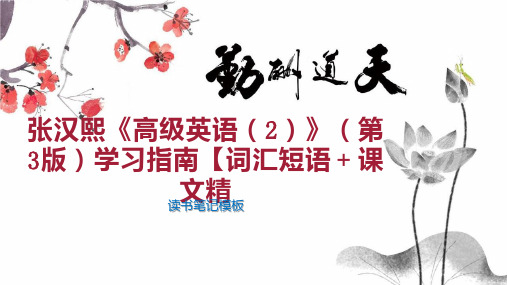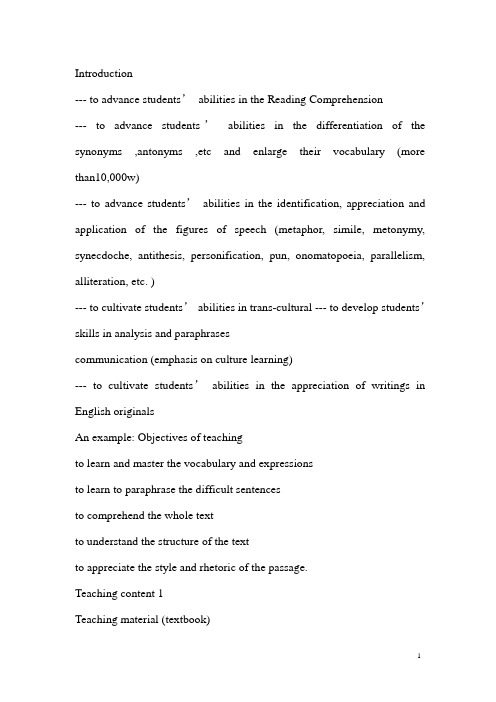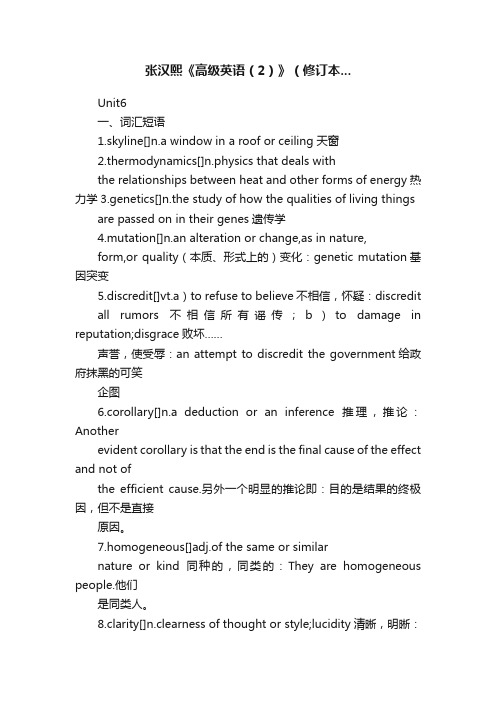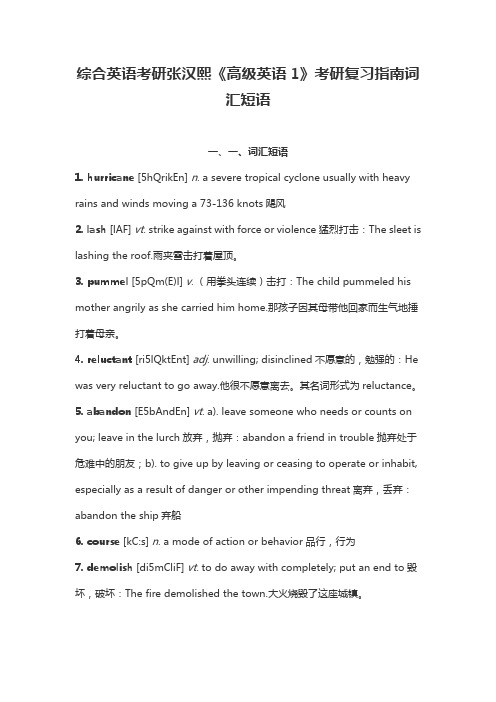高级英语张汉熙笔记
综合英语考研张汉熙《高级英语2》考研复习资料词汇语法

综合英语考研张汉熙《高级英语2》考研复习资料词汇语法一、一、词汇短语1. intricate [5intrikit] adj. complex; solvable or comprehensible only with painstaking effort错综复杂的;难懂的,难以解决的:an intricate design难懂的设计2. indulge [in5dQldV] vt. to yield to the desires and whims of, especially to an excessive degree沉迷,放纵,纵情享受:indulge oneself in eating and drinking纵情于吃喝。
与其构成的短语有:indulge in沉溺于;饱享3. meander [mi5AndE] vi. to move aimlessly and idly without fixed direction漫游,闲逛:We usually meander down to the pub after the dinner.晚饭之后,我们常常漫步去酒吧。
4. conversationalist [7kCnvE5seiFEnElist] n. one given to or skilled at conversation健谈者:He is even-tempered, easy-going and an excellent conversationalist.他处事不惊,待人随和,同时也是个非常健谈的人。
5. anecdote [5AnikdEut] n. a short account of an interesting or humorous incident轶事,奇闻:He told one or two amusing anecdotes about his years as a policeman.他讲述了一两桩他当警察时的趣事。
张汉熙《高级英语(1)》(第3版)学习指南【词汇短语+课文精解+全文翻译+练习答案】(Lesson

张汉熙《⾼级英语(1)》(第3版)学习指南【词汇短语+课⽂精解+全⽂翻译+练习答案】(LessonLesson 14 Speech on Hitler’s Invasion of the U.S.S.R.⼀、词汇短语1. horde n. a large group or crowd; a swarm群,⼈群:hordes of people ⼤群⼈2. Cabinet n. the politicians with important positions in agovernment who meet to make decisions or advise the leader of thegovernment内阁3. croquet n. a game played on grass in which players hit ballswith wooden mallets槌球游戏4. luncheon n. a lunch, especially a formal one午宴,正式的午餐5. Nazi n. a member of the National Socialist German Workers’Party, founded in Germany in 1919 and brought to power in 1933 under Adolph Hitler纳粹分⼦6. regime n. a government in power; administration当权政府,统治:They are suffered under the new regime.他们遭受新政府的统治。
7. devoid adj. completely lacking; destitute or empty完全没有的,缺乏的(of):be devoid of common sense缺乏常识8. excel vt. to do or be better than; surpass优于,超过:excel sb. in knowledge学识过⼈9. ferocious adj. extremely savage; fierce极为野蛮的,残忍的;凶猛的:ferocious animals凶猛的野兽10. threshold n. the place or point of beginning; the outset起点,开端:at the threshold of在……的开始11. till vt. to prepare (land) for the raising of crops, as by plowing andharrowing; cultivate耕作,耕耘:till the field耕耘⼀⽚⽥地12. adj. extending back beyond memory orrecord; ancient古⽼的,远古的,⽆法追忆的13. wring vt. to obtain or extract by applying force or pressure迫取,强求,榨取:The police had wrung the truth out of the recalcitrant witness.警察从那个顽固的⽬击者⼝中逼出事情的真相。
张汉熙《高级英语(2)》(第3版)学习指南【词汇短语+课文精

四、全文翻译
五、练习答案
二、课文精解
一、词汇短语
三、文体修辞
四、全文翻译
五、练习答案
作者介绍
同名作者介绍
读书笔记
读书笔记
这是《张汉熙《高级英语(2)》(第3版)学习指南【词汇短语+课文精解+全文翻译+练习答案】》的读 书笔记模板,可以替换为自己的心得。
精彩摘录
精彩摘录
这是《张汉熙《高级英语(2)》(第3版)学习指南【词汇短语+课文精解+全文翻译+练习答案】》的读 书笔记模板,可以替换为自己的精彩内容摘录。
谢谢观看
目录分析
二、课文精解
一、词汇短语
三、文体修辞
四、全文翻译
五、练习答案
二、课文精解
一、词汇短语
三、ห้องสมุดไป่ตู้体修辞
四、全文翻译
五、练习答案
1
一、词汇短语
2
二、课文精解
3
三、文体修辞
4
四、全文翻译
5
五、练习答案
二、课文精解
一、词汇短语
三、文体修辞
四、全文翻译
五、练习答案
二、课文精解
一、词汇短语
张汉熙《高级英语(2)》(第 3版)学习指南【词汇短语+课
文精
读书笔记模板
01 思维导图
03 目录分析 05 读书笔记
目录
02 内容摘要 04 作者介绍 06 精彩摘录
思维导图
本书关键字分析思维导图
难点
短语
学习指南
课次
言简意赅
文体
短语
教材
学生
全文
词汇
翻译
答案
二课文
内容摘要
内容摘要
《高级英语(2)(第3版)学习指南》按照原教材的课次进行编写,每单元涉及词汇短语、课文精解、文体 修辞、全文翻译以及练习答案等内容,旨在帮助学生更好、更高效地学习和掌握教材中的重点及难点知识,具有 很强的针对性和实用性。在编写过程中,该书力求突出重点,答疑难点,语言言简意赅,讲解深入浅出,希望它 能得到广大英语专业学生和英语自学者的喜爱和认可。
高级英语张汉熙笔记

Introduction--- to advance students’abilities in the Reading Comprehension--- to advance students’abilities in the differentiation of the synonyms ,antonyms ,etc and enlarge their vocabulary (more than10,000w)--- to advance students’abilities in the identification, appreciation and application of the figures of speech (metaphor, simile, metonymy, synecdoche, antithesis, personification, pun, onomatopoeia, parallelism, alliteration, etc. )--- to cultivate students’abilities in trans-cultural --- to develop students’skills in analysis and paraphrasescommunication (emphasis on culture learning)--- to cultivate students’abilities in the appreciation of writings in English originalsAn example: Objectives of teachingto learn and master the vocabulary and expressionsto learn to paraphrase the difficult sentencesto comprehend the whole textto understand the structure of the textto appreciate the style and rhetoric of the passage.Teaching content 1Teaching material (textbook)“Advanced English” Boo k 1---Zhang Hanxi (张汉熙主编)---Foreign Language Teaching and Research Press (外语教学与研究出版社)How to Write a Book ReportThe front cover includesTitle(书名/文章题目): _____________Author(作者):_______________Class and grade:_______________No. of pages or no. of words(页数或字数):______________Name the main character(主人公):___Date: M/D/YHow to Write a Book Report p1. Brief introduction to the author and the book;2. The peculiarity of the book in the expressing or developing the content;3. The most impressive part ;4. The message delivered by the author;5. Your favorite part;6. Your comment or opinion on the book;7. What you have got after reading the book;8. The citations.Unit One The Middle Eastern BazaarLead-inTextual Structure of the TextDetailed Study of the TextRhetorical DevicesThe Middle EastGenerally referring to the area from Afghanistan to Egypt, including the Arabian Peninsula, Cyprus, and Asiatic Turkey.The Middle East is a loosely defined geographic region; the countries listed are generally considered part of the Middle East. These Middle East countries are part of the Asian continent, with the exception of Egypt, which is part of Africa, and the northwestern part of Turkey, which is part of the European landmass.Rich in oil, linking point of three continents. Nearby five seas: Black Sea, Mediterranean Sea, Red Sea, Arabian Sea, Caspian Sea (里海)BazaarBazaar: A market consisting of a street lined with shops and stalls, especially one in the Middle East.---handicraft economy, contrast to the modern societyThree famous bazaars in the Middle East:The Khan Khalili Bazaar in Cairo, Egypt埃及开罗汗·哈利利集市The Grand Bazaar in Istanbul, Turkey土耳其伊斯坦布尔大市集The Damascus Bazaar in Syria叙利亚大马士革集市China’s most busiest markets:Xiushui Street and Da Zha Lan in Beijing北京大栅栏和秀水街References“The history of Middle East”(Mesopotamia Civilization, Civilization of Ancient Egypt, Middle East Wars)“The Bible—Old Testament”(the first half of the Christian Bible)“Talmud”塔尔穆德(犹太法典)(the basis of religious authority in Orthodox Judaism)犹太法典中的几句箴言有四种人,一种人说:“我的是我的,你的是你的。
张汉熙《高级英语(2)》(修订本...

张汉熙《高级英语(2)》(修订本...Unit6一、词汇短语1.skyline[]n.a window in a roof or ceiling天窗2.thermodynamics[]n.physics that deals withthe relationships between heat and other forms of energy热力学3.genetics[]n.the study of how the qualities of living things are passed on in their genes遗传学4.mutation[]n.an alteration or change,as in nature,form,or quality(本质、形式上的)变化:genetic mutation基因突变5.discredit[]vt.a)to refuse to believe不相信,怀疑:discreditall rumors不相信所有谣传;b)to damage in reputation;disgrace败坏……声誉,使受辱:an attempt to discredit the government给政府抹黑的可笑企图6.corollary[]n.a deduction or an inference推理,推论:Anotherevident corollary is that the end is the final cause of the effect and not ofthe efficient cause.另外一个明显的推论即:目的是结果的终极因,但不是直接原因。
7.homogeneous[]adj.of the same or similarnature or kind同种的,同类的:They are homogeneous people.他们是同类人。
综合英语考研张汉熙《高级英语1》考研复习指南词汇短语

综合英语考研张汉熙《高级英语1》考研复习指南词汇短语一、一、词汇短语1. hurricane [5hQrikEn] n. a severe tropical cyclone usually with heavy rains and winds moving a 73-136 knots飓风2. lash [lAF] vt. strike against with force or violence猛烈打击:The sleet is lashing the roof.雨夹雪击打着屋顶。
3. pummel [5pQm(E)l] v.(用拳头连续)击打:The child pummeled his mother angrily as she carried him home.那孩子因其母带他回家而生气地捶打着母亲。
4. reluctant [ri5lQktEnt] adj. unwilling; disinclined不愿意的,勉强的:He was very reluctant to go away.他很不愿意离去。
其名词形式为reluctance。
5. abandon [E5bAndEn] vt. a). leave someone who needs or counts on you; leave in the lurch放弃,抛弃:abandon a friend in trouble抛弃处于危难中的朋友;b). to give up by leaving or ceasing to operate or inhabit, especially as a result of danger or other impending threat离弃,丢弃:abandon the ship弃船6. course [kC:s] n. a mode of action or behavior品行,行为7. demolish [di5mCliF] vt. to do away with completely; put an end to毁坏,破坏:The fire demolished the town.大火烧毁了这座城镇。
张汉熙《高级英语(1)》(第3版)学习指南【词汇短语+课文精解+全文翻译+练习答案】(Lesson
张汉熙《⾼级英语(1)》(第3版)学习指南【词汇短语+课⽂精解+全⽂翻译+练习答案】(LessonLesson 12 Ships in the Desert (Edited)⼀、词汇短语1. anchor n. & v. to hold fast by or as if by an anchor抛锚,锚定:They layat anchor outside the harbor.他们在港外抛锚停泊。
2. lap vt. to wash or slap against with soft liquid sounds拍打:The waveswere lapping the side of the boat.波浪击打着船的侧⾯。
3. comparable adj. that can be compared可⽐较的,⽐得上的4. underlying adj. fundamental, basic在下⾯的,根本的,潜在的5. parka n. a thick warm jacket with a hood⽑⽪风雪⼤⾐,⽪制⼤⾐6. glacier n. a large mass of ice and snow thatforms in areas where the rate of snowfall constantly exceeds the rate atwhich the snow melts; it moves slowly outward from the center ofaccumulation or down a mountain until it melts or breaks away冰川7. emission n. a gas or other substance that is sent into the air排放,排出物:fume emission尘雾排放8. inexorable adj. not capable of being persuaded byentreaty; relentless不可变的,残酷⽆情的:the inexorable passage of theseasons⼈⼒不能改变的四季转移9. graph n. a diagram, as a curve, broken lines, series of bars, etc.,representing the successive changes in a variable quantity or quantities图表,曲线图10. frigid adj. extremely cold极其寒冷的:Frigid winds blew fromthe north.寒风从北⽅刮来。
张汉熙《高级英语(1)》(修订本)学习指南【词汇短语+课文精解+全文翻译+练习答案】-Unit14
张汉熙《⾼级英语(1)》(修订本)学习指南【词汇短语+课⽂精解+全⽂翻译+练习答案】-Unit14Unit 14 Argentia Bay⼀、词汇短语1. pervade [] vt. to be present throughout; permeate蔓延,遍及,弥漫:The air is pervaded by a smoking.空⽓中弥散着⼀种烟味。
2. haze [] n. light thin mist or smoke薄雾,尘雾:I couldn’t see her throughthe haze of smoke.在烟雾弥漫中,我看不见她。
3. tint[]n. a slight coloration; a tinge浅⾊:The painting glowed withbeautiful autumn tints.这幅油画映现出美丽的淡淡的秋⾊。
4. chore [] n. a routine or minor duty⽇常⼯作:As a child one of my choreswas to feed the animals.⼩时候我的杂活之⼀就是喂动物。
5. squawk [] n. a loud screech粗厉的叫声6. camouflage [] v. a). to conceal by the use of disguise or byprotective coloring or garments that blend in with the surroundingenvironment伪装,掩饰:camouflage ships by painting them gray将船涂上灰⾊以便伪装;b). to use protective coloring or garments forconcealment伪装,隐藏:We camouflaged in the bushes and no onesaw us.我们隐藏在灌⽊丛中没有被⼈发现。
高级英语第三版第二册张汉熙1-6,8课课文翻译要点
Unit 1 Pub Talk and the King’s English 人类的一切活动中,只有闲谈最宜于增进友谊,而且是人类特有的一种活动。
动物之间的信息交流,不论其方式何等复杂,也是称不上交谈的。
闲谈的引人人胜之处就在于它没有一个事先定好的话题。
它时而迂回流淌,时而奔腾起伏,时而火花四射,时而热情洋溢,话题最终会扯到什么地方去谁也拿不准。
要是有人觉得“有些话要说”,那定会大煞风景,使闲聊无趣。
闲聊不是为了进行争论。
闲聊中常常会有争论,不过其目的并不是为了说服对方。
闲聊之中是不存在什么输赢胜负的。
事实上,真正善于闲聊的人往往是随时准备让步的。
也许他们偶然间会觉得该把自己最得意的奇闻轶事选出一件插进来讲一讲,但一转眼大家已谈到别处去了,插话的机会随之而失,他们也就听之任之。
或许是由于我从小混迹于英国小酒馆的缘故吧,我觉得酒瞎里的闲聊别有韵味。
酒馆里的朋友对别人的生活毫无了解,他们只是临时凑到一起来的,彼此并无深交。
他们之中也许有人面临婚因破裂,或恋爱失败,或碰到别的什么不顺心的事儿,但别人根本不管这些。
他们就像大仲马笔下的三个火枪手一样,虽然日夕相处,却从不过问彼此的私事,也不去揣摸别人内心的秘密。
有一天晚上的情形正是这样。
人们正漫无边际地东扯西拉,从最普通的凡人俗事谈到有关木星的科学趣闻。
谈了半天也没有一个中心话题,事实上也不需要有一个中心话题。
可突然间大伙儿的话题都集中到了一处,中心话题奇迹般地出现了。
我记不起她那句话是在什么情况下说出来的——她显然不是预先想好把那句话带到酒馆里来说的,那也不是什么非说不可的要紧话——我只知道她那句话是随着大伙儿的话题十分自然地脱口而出的。
“几天前,我听到一个人说‘标准英语’这个词语是带贬义的批评用语,指的是人们应该尽量避免使用的英语。
”此语一出,谈话立即热烈起来。
有人赞成,也有人怒斥,还有人则不以为然。
最后,当然少不了要像处理所有这种场合下的意见分歧一样,由大家说定次日一早去查证一下。
张汉熙《高级英语(1)》(第3版)学习指南【词汇短语+课文精解+全文翻译+练习答案】(Lesson
张汉熙《⾼级英语(1)》(第3版)学习指南【词汇短语+课⽂精解+全⽂翻译+练习答案】(LessonLesson 3 Blackmail⼀、词汇短语1. blackmail n. extortion of money by threats to exposediscrediting information敲诈,勒索:If someone tried to blackmail me Iwould tell the police.如果有⼈企图敲诈我,我就向警察告发。
2. suite n. a series of connected rooms used as a living unit⼀套房间:T hey assembled in the chairman’s office suite.他们聚集在总统的办公室套间⾥。
3. cryptic adj. secret or occult秘密的,不公开的:a cryptic remark 含义隐晦的话4. fray vt. to alarm; frighten使惊恐,使害怕5. buzzer n. an electric signaling device, such as a doorbell, that makesa buzzing sound电铃,门铃6. dispatch vt. to send someone or something somewhere for aparticular purpose分派,派遣:dispatch a messenger派遣使者7. errand n. a short trip taken to perform a specified task, usually foranother差事:I’ve got a few errands to do in the town.我有⼏件事要进城办。
[搭配]run errand跑腿8. piggy adj. like a pig; greedy猪⼀般的;贪婪的9. sardonically adv. scornfully or cynically mocking讥讽地,嘲笑地10. gross adj. overweight; heavy臃肿的,肥胖的11. encompass vt. to form a circle or ring around; surround围绕,环绕:The course will encompass physics, chemistry and biology.课程将包括物理、化学和⽣物学。
- 1、下载文档前请自行甄别文档内容的完整性,平台不提供额外的编辑、内容补充、找答案等附加服务。
- 2、"仅部分预览"的文档,不可在线预览部分如存在完整性等问题,可反馈申请退款(可完整预览的文档不适用该条件!)。
- 3、如文档侵犯您的权益,请联系客服反馈,我们会尽快为您处理(人工客服工作时间:9:00-18:30)。
Unit One The Middle Eastern BazaarLead-inTextual Structure of the TextDetailed Study of the TextRhetorical DevicesThe Middle EastGenerally referring to the area from Afghanistan to Egypt, including the Arabian Peninsula, Cyprus, and Asiatic Turkey.The Middle East is a loosely defined geographic region; the countries listed are generally considered part of the Middle East. These Middle East countries are part of the Asian continent, with the exception of Egypt, which is part of Africa, and the northwestern part of Turkey, which is part of the European landmass.Rich in oil, linking point of three continents. Nearby five seas: Black Sea, Mediterranean Sea, Red Sea, Arabian Sea, Caspian Sea (里海)BazaarBazaar: A market consisting of a street lined with shops and stalls, especially one in the Middle East.---handicraft economy, contrast to the modern societyThree famous bazaars in the Middle East:The Khan Khalili Bazaar in Cairo, Egypt埃及开罗汗·哈利利集市The Grand Bazaar in Istanbul, Turkey土耳其伊斯坦布尔大市集The Damascus Bazaar in Syria叙利亚大马士革集市China’s most busiest markets:Xiushui Street and Da Zha Lan in Beijing北京大栅栏和秀水街References“The history of Middle East”(Mesopotamia Civilization, Civilization of Ancient Egypt, Middle East Wars)“The Bible—Old Testament”(the first half of the Christian Bible)“Talmud”塔尔穆德(犹太法典)(the basis of religious authority in Orthodox Judaism) 犹太法典中的几句箴言有四种人,一种人说:“我的是我的,你的是你的。
”这是平凡人;一种人说:“我的是你的,你的是我的。
”这是庸俗人;一种人说:“你的我的全是我的。
”这是邪恶人;一种人说:“我的你的全是你的。
”这是敬虔人。
上帝不以男人的头创造女人,因为女人不可支配男人;但也不以男人的脚创造女人,因为女人不可成为男人的奴隶;而以男人的肋骨创造女人,因为要她永远贴近他的心。
20岁不潇洒,30岁不成业,40岁不富有,50岁不幸福,那一辈子就完了。
Section I (Para 1)3. You pass from the heat and glare of a big, open square into a cool, dark cavern which extends as far as the eye can see, losing itself in the shadowy distance.heat coolGlare darkopen square cavernas far as the eye can seethe words eye and ear are used in the singular form not to mean the concrete organ of sight or hearing but something abstract; they are often used figuratively. Here the eye means man’s power of seeing or eyesight.She has an eye for beauty. (审美眼光)She has an ear for music.(对音乐有鉴赏力)The boy has a sharp eye.(敏锐的眼光)The big poster caught my eye.(引起某人注意)Keep an eye on that mischievous boy.(留意,照看)To turn a blind eye to sth.(对…视而不见)To turn a deaf ear to sth. (对…充耳不闻)Glare: strong, fierce, unpleasant light, not so agreeable and welcome a “bright sunlight”刺眼的光太阳光很刺眼,我得戴上墨镜。
I have to wear sunglasses because of the glare of the sun.Cavern:a cave, especially a large cave. Here, it is a long, narrow, dark street of workshops and shops with some sort of roof over them.In our text it means the bazaar looks like a cavern because it is a long, narrow, and dark street of workshops and shops with some sort of a roof over it. Here the author employed a metaphor (隐喻,暗喻)to achieve vividness.Glare: strong, fierce, unpleasant light, not so agreeable and welcome a “bright sunlight”刺眼的光太阳光很刺眼,我得戴上墨镜。
I have to wear sunglasses because of the glare of the sun.Cavern:a cave, especially a large cave. Here, it is a long, narrow, dark street of workshops and shops with some sort of roof over them.In our text it means the bazaar looks like a cavern because it is a long, narrow, and dark street of workshops and shops with some sort of a roof over it. Here the author employed a metaphor (隐喻,暗喻)to achieve vividness.Losing itself in the shadowy distance:The place is dark, so when the street is long, objects in the distance become unclear and indistinct (faint, dim).The word shadowy suggests shifting illumination and indistinct vision.Disappearing in the faint distance; beyond one’s eyesight.What kind of sound do the bells make?harmoniously tinkling bells: the sounds from the bells are rhythmic and pleasant to the earE.g.: He has only a few coins tinkling/jingling in his pocket.How do the donkeys move?thread one’s way: to move through a place by carefully going around things that are blocking one’s wayE.g.: The cat threaded its way among the dishes on the shelf.Do you think it is ok to replace "throngs" with "crowds" in this sentence? Why? Please explain the di fferences between throngs of people and crowds of people, and why the writer uses “the throngs of people entering and leaving the bazaar” instead of “crowds of people”?throngs of people : a stronger implication of movement and of pushing and a weaker implication of density熙熙攘攘的人群(动态)crowds of people: emphasize its density拥挤的人群(静态)5. The roadway is about twelve feet wide, but it is narrowed every few yards by little stalls where goods of every conceivable kind are sold.Stall: small, open-fronted shop used by a trader in a market, on a street货摊E.g.: a book-stall; a flower-stallgoods of every conceivable kind: goods of every kind you can think ofe.g. people of every conceivable age, nationality; buildings of every conceivable 6. The din of the stall-holders crying their wares, of donkey-boys and porters clearing a way for themselves by shouting vigorously, and of would-be purchasers arguing and bargaining is continuous and makes you dizzy.What sources does the din come from? Illustrate the sentence p attern “the din of …”parallelism :stall-holders crying their waresdonkey-boys and porters clearing a way Din: specific word of noise ; loud, confused noise that continues 喧嚣E.g.: The children were making so much din that I could not make myself heard.Explain the differences between “din” and “noise”.din : specific; noise: generalDin: confused ( the mixture of crying their wares, clearing a way, arguing and bargaining) noise: unpleasant sound.would-be purchasers arguing and bargainingwares (always-pl.) articles offered for sale, usu. not in a shop. The word gives the impression of traditional commodity, items, goods, more likely to be sold in free-markets.Ware (usually used in combination) articles of the same kind or material; 制品,器具,货物E.g.: silverware, bronze ware, kitchenware, software, hardwarewould-be :likely, intended to bee.g.: a would-be musician / football playerdizzy: feeling as if everything were turning round , mentally confusede.g.: If you suffer from anemia, you often feel dizzy.The two-day journey on the bus makes me dizzy.How do you paraphrase this sentence “The din ... and makes you dizzy: ”?The loud, confused noise of …continues without interruption and makes you feel mentally confused.What’s your genera l impression of the entrance of Middle Eastern bazaar? From what perspectives does the writer describe?General impression: ancient (take you back hundreds of years, aged brick and stone. )The writer describes the entrance from the perspectives of sight, feeling, and sound.Sight: glare, dark, as far as the eye can see, losing itself in the shadowy distance.Feeling: heat, coolSound: tinkling, din, crying their wares, shouting vigorously, arguing and bargainingSummaryThe writer describes the bazaar with sound from the animal and human-being at the very beginning, so as to present a lively and busy atmosphere.Introduction: A description of the entrance to the bazaara. The Gothic gatewayb. Contrast between the heat and glare in the open square and the coolness and dimness in the interior of the bazaarc. Another contrast between the pleasing sound of the tinkling of donkey bells and the confusing dind. The little stalls encroaching on the street, making the roadway narrower and narrower. Section 2 (Para 2)Questions(1) What was your general impression of the cloth-market? How does the writer achieve this? General impression: quietThe writer describes the cloth-market as a quiet place, mainly from the perspective of sound.e.g. the noise fades away, muted, deadens the sound, hardly any sounds to echo, measured tones. Paragraph 1 and 2 show a sharp contrast of sound.The entrance is with a continuous mixture of sounds, while the cloth-market is comparatively much quiet.Why is the cloth—market muted?The earthen floor deadens the sound of the footsteps; the shopkeepers speak in low, measured tones and the buyers follow suit.(3) The earthen floor . . . any sounds to echo: (translate into Chinese)这里的泥土地面,被无数双脚板踩踏得硬邦邦的,人走在上面几乎听不到脚步声了,而拱形的泥砖屋顶和墙壁也难得产生什么回音效果。
